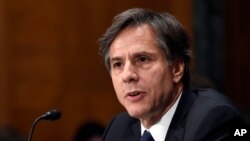A joint program sponsored by the U.S. and Chinese governments to help early-career diplomats from Afghanistan develop diplomatic skills welcomed a new class Wednesday in Washington.
The 15 trainees met at the State Department before beginning an extensive four-week program.
This is the fourth year the United States and China have partnered to train the Afghan diplomatic corps on diplomacy, communications and management skills. Building on the success of this partnership, the three countries will extend the program to train Afghanistan’s agricultural and medical care personnel this year.
U.S. Deputy Secretary of State Antony Blinken welcomed the trainees by saying Washington and Beijing share the same stake in Kabul’s sustainable development.
"This program has not only supported the new generation of Afghan leaders, all of you, but it has also helped to lay the groundwork for the United States and China to work together toward a stable, secure, prosperous and unified Afghanistan,” said Blinken.
Since the launch of the Afghan Diplomat Training Program in 2012, representatives from the United States and Chinese embassies in Kabul jointly have selected a group of 15 promising young diplomats each year. Forty-five diplomats under the age of 35 have graduated.
Afghanistan Ambassador to the United States Hamdullah Mohib said two male and two female graduates are now working for his embassy.
The U.S.-China training program for Afghan diplomats is an outcome of the U.S-China Strategic and Economic Dialogue.
Reading a letter from Chinese Foreign Minister Wang Yi, China's U.S. ambassador, Cui Tiankai, said this partnership had become one of the highlights of U.S.-China cooperation.
"As you know at the end of this month, President Xi Jinping of China will pay a state visit to the United States," the ambassador said. "I am very happy to see this program become one of the deliverables on the agenda of the summit between President Xi and President [Barack] Obama.”
The 15 Afghan diplomats also attended the State Department daily briefing. They will spend two weeks in Washington and New York, followed by a two-week visit to Beijing and other Chinese cities in October.
The extensive program includes site visits and meetings at the State Department, vice president's office, the Atlantic Council, the Senate and the United Nations in New York.




